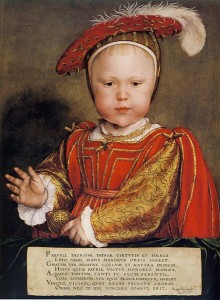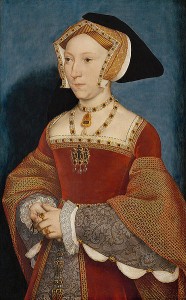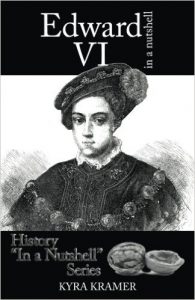 Thank you so much to Kyra Kramer for writing this guest post in honour of King Edward VI’s birthday.
Thank you so much to Kyra Kramer for writing this guest post in honour of King Edward VI’s birthday.
Kyra has just released a fascinating book on Edward, Edward VI in a Nutshell and you can find out more about it at the bottom of this post and find out how you can win a copy of the book.
Edward VI came into the world on 12 October 1537 and was greeted with what can only be described as a lot of hoopla. Here was the son that Henry VIII had been trying to have for more than two decades! Jane Seymour, Henry’s third queen, was the triumphant mother of the royal prince. The rejoicing, both in the court and throughout the country, was immense. As I explain in my latest book, Edward VI in a Nutshell:
Every church in London sung Te Deum and there was a formal procession of thanksgiving in St Paul’s at eight o’clock that morning. The church bells rang all through the day and into the night, pealing out the nation’s happiness that God had blessed them all with a prince. There were bonfires everywhere, ‘fruites and wyne’ were distributed generously by royal command, and there was a 2,000-gun salute from the Tower.
The infant was swaddled and placed immediately with his wet-nurses and nursemaids. In the care of these devoted servants, Edward was whisked away from his mother. The newly-built nursery in Hampton Court had been thoroughly scrubbed down on Henry’s orders, and the tiny prince was taken to the security of his new residence.
There is no record, as there was with Anne Boleyn, that the baby’s mother asked to nurse him herself. This does not mean, of course, that Jane didn’t love her son as much as Anne loved her daughter. It is just as likely that Jane did not want to ask for something she already knew she would be denied than that she didn’t care if she nursed little Edward or not. Additionally, Jane knew the protocol of royal births and evidence suggests she was not the kind of person to raise much of a fuss to change it. With few exceptions, what we know of Jane suggests she was easy-going and conciliatory.
Jane, though doubtlessly exhausted from her physical efforts, had one more chore to perform before she could rest. By tradition, it was the queen’s job to formally announce the birth to the king. There is still a record of Jane’s letter to Henry, and it bursts with the elation and pride she was clearly feeling:
Right trusty and well beloved, we greet you well, and for as much as by the inestimable goodness and grace of Almighty God, we be delivered and brought in childbed of a prince, conceived in most lawful matrimony between my the king’s majesty and us, doubting not but that for the love and affection which you bear unto us and to the commonwealth of this realm, the knowledge thereof should be joyous and glad tidings unto you, we have thought good to certify you of the same. To the intent you might not only render unto God condign thanks and prayers for so great a benefit but also continually pray for the long continuance and preservation of the same here in this life to the honour of God, joy and pleasure of my lord the king and us, and the universal wealth, quiet and tranquility of this whole realm.
 To be honest, before I started writing the book on Edward I had never given him much thought. In part, it was because his short reign seemed insignificant compared to the monarchial spans of the other Tudors. However, another part of it was that I just don’t like Jane Seymour. In my opinion, she did everything that Anne Boleyn was unfairly accused of and came out smelling like a historical rose. That offends my sense of fairness. The fact she was the lucky recipient of a Y-chromosome sperm and is given “credit” for a having boy when women have nothing to do with the gender of their infant just added to my feelings of cosmic injustice. What did I care about Jane’s sickly son when I could read about Anne’s daughter, Good Queen Bess?
To be honest, before I started writing the book on Edward I had never given him much thought. In part, it was because his short reign seemed insignificant compared to the monarchial spans of the other Tudors. However, another part of it was that I just don’t like Jane Seymour. In my opinion, she did everything that Anne Boleyn was unfairly accused of and came out smelling like a historical rose. That offends my sense of fairness. The fact she was the lucky recipient of a Y-chromosome sperm and is given “credit” for a having boy when women have nothing to do with the gender of their infant just added to my feelings of cosmic injustice. What did I care about Jane’s sickly son when I could read about Anne’s daughter, Good Queen Bess?
The only reason I started writing the book on Edward is because I have a plausible reason for why he, his paternal uncle, Arthur Tudor, and his half-brother, Henry Fitzroy, all died in such a similar fashion in their mid-teens. I dove into my research on Edward’s life merely to get to the “important” parts of his death.
Well, the joke was on me. I found Edward fascinating. Not only did he remind me of both his half-sisters, he was a complex and intriguing person in his own right. He was as devout as a Mary regarding his beliefs, and as cerebral as Elizabeth. He was a polymath like Henry VIII, but his personality was more like his rather stern grandfather Henry VII than his fun-loving father. He had, like all Tudors, a will of iron and a rock-solid determination to do as he saw fit. He may have only been fifteen years old when he died, but he had been the driving force of his own policies since he was thirteen. I had always thought that Edward was a puppet king for the Duke of Somerset and then the Duke of Northumberland, but nothing could have been further from the truth. Edward was his own man years before he reached the age of manhood.
By the time I was finished writing Edward VI in a Nutshell I was genuinely grieved that the young king had never gotten to live up to his potential. What a sovereign he would have been! He would probably have been as canny as Elizabeth without the burden of being a woman. But would he have been harsher toward Catholics? His sister Mary had lashed out at the Protestants she saw as endangering the souls of her subjects; would Edward have crushed those he saw as false idolaters? Would there have been a sort-of reverse inquisition under this implacable and fundamentalist ruler? Would he have had more penchant for warfare than Elisabeth? Would Spain and England have come to loggerheads anyway? Would he have been able to reproduce more successfully than his father, spawning a Tudor dynasty that lasted centuries rather than decades?
We’ll never know, because this brilliant and capable king died horribly when he was still a youngster. For the first time, I see that as a true tragedy for England instead of a step toward the creation of Queen Elizabeth I, the greatest monarch to ever grace the British throne.
Edward VI in a Nutshell
 MadeGlobal’s History in a Nutshell Series aims to give readers a good grounding in a historical topic in a concise, easily digestible and easily accessible way.
MadeGlobal’s History in a Nutshell Series aims to give readers a good grounding in a historical topic in a concise, easily digestible and easily accessible way.
Born twenty-seven years into his father’s reign, Henry’s VIII’s son, Edward VI, was the answer to a whole country’s prayers. Precocious and well-loved, his life should have been idyllic and his own reign long and powerful. Unfortunately for him and for England, that was not to be the case. Crowned King of England at nine years old, Edward was thrust into a world of power players, some who were content to remain behind the throne, and some who would do anything to control it completely. Devoutly Protestant and in possession of an uncanny understanding of his realm, Edward’s actions had lasting effects on the religious nature of the kingdom and would surely have triggered even more drastic changes if he hadn’t tragically and unexpectedly died at the age of fifteen.
Physicians of the day wrote reams of descriptions of the disease that killed him, but in Edward VI in a Nutshell, medical anthropologist Kyra Kramer (author of Henry VIII’s Health in a Nutshell) proposes a new theory of what, exactly, caused his death.
Straightforward and informative, Edward VI in a Nutshell will give readers a better understanding than they’ve ever had of the life, reign, and death, of England’s last child monarch.
Paperback: 108 pages
Publisher: MadeGlobal Publishing; 1 edition (October 11, 2016)
Language: English
ISBN-10: 8494593706
ISBN-13: 978-8494593703
ASIN: B01KXHSJXO
Available as a paperback and kindle book – use this link http://getbook.at/edward_vi to find out more about the book on your country’s Amazon site.
Kyra Cornelius Kramer is a freelance academic with BS degrees in both biology and anthropology from the University of Kentucky, as well as a MA in medical anthropology from Southern Methodist University. She has written essays on the agency of the Female Gothic heroine and women’s bodies as feminist texts in the works of Jennifer Crusie. She has also co-authored two works; one with Dr. Laura Vivanco on the way in which the bodies of romance heroes and heroines act as the sites of reinforcement of, and resistance to, enculturated sexualities and gender ideologies, and another with Dr. Catrina Banks Whitley on Henry VIII.
Kyra is also the author of Blood will Tell: A medical explanation of the tyranny of Henry VIII, Henry VIII’s Health in Nutshell, and The Jezebel Effect: Why the sl*t shaming of famous queens still matters.
Giveaway
To be in with a chance of winning a paperback copy of this book, all you have to do is leave a comment below by midnight Monday 17th October explaining why you’d love to read this book. One lucky comment will be picked at random and the writer contacted for their details.